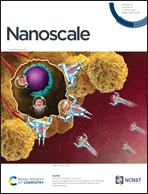A tumor-activatable peptide supramolecular nanoplatform for the delivery of dual-gene targeted siRNAs for drug-resistant cancer treatment†
Abstract
Combinatorial short interference RNA (siRNA) technology for the silencing of multiple genes is expected to provide an effective therapeutic approach for cancer with complex genetic mutation and dysregulation. Herein we present a tumor-activatable supramolecular nanoplatform for the delivery of siRNAs to target telomerase and telomeres for paclitaxel-resistant non-small-cell lung cancer (A549/PTX) treatment. Two different sequences of siRNA are incorporated in a single nanoparticle, which is obtained by self-assembly from a peptide dendrimer. The siRNA stability is improved by the nanoparticle in the presence of serum compared to free siRNA, and these siRNAs are protected from RNA enzyme degradation. In the tumor extracellular acid environment, the PEG corona of the nanoparticle is removed to promote the internalization of siRNAs into tumor cells. The disulfide linkages between the nanoparticle and siRNAs are cleared in the reductive environment of the tumor cells, and the siRNAs are released in the cytoplasm. In vitro experiments show that the gene expression of hTERT and TRF2 at the mRNA and protein levels of A549/PTX tumor cells is down-regulated, which results in cooperative restraining proliferation and invasion of A549/PTX tumor cells. For the tumor cell-targeting function of the MUC1 aptamer and the EPR effect, sufficient tumor accumulation of nanoparticles was observed. Meanwhile, a shift of negative surface charge of nanoparticles to positive charge in the tumor extracellular microenvironment enhances deep penetration of siRNA-incorporating nanoparticles into tumor tissues. In vivo animal studies support that successful down-regulation of hTERT and TRF2 gene expression achieves effective inhibition of the growth and neovascularization of drug-resistant tumor cells. This work has provided a new avenue for drug-resistant cancer treatment by designing and synthesizing a tumor-activatable nanoplatform to achieve the delivery of dual-gene targeted combinatorial siRNAs.



 Please wait while we load your content...
Please wait while we load your content...